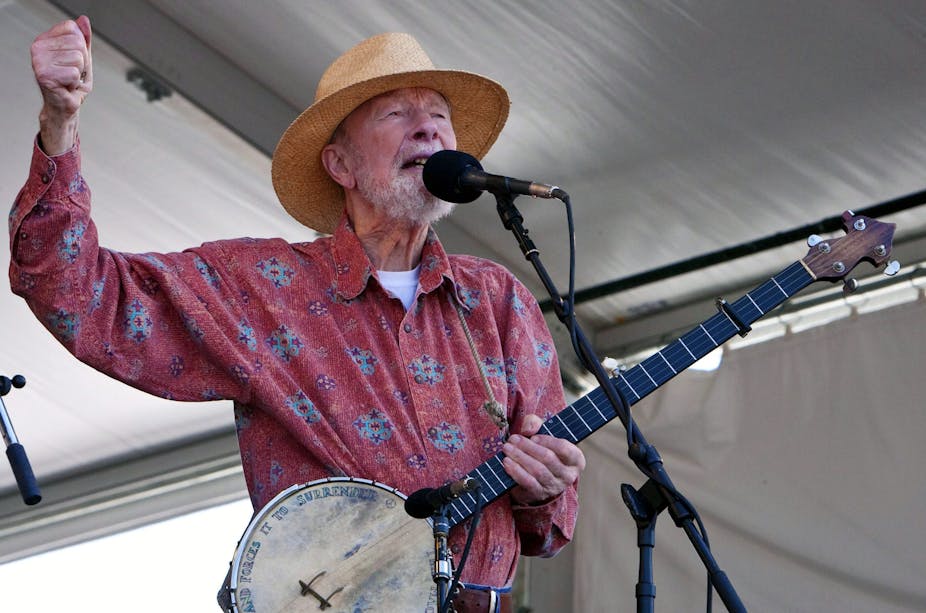We Shall Overcome became the theme song of the American civil rights movement in the 1960s. It is most identified with Pete Seeger, the great American musician who died January 27.
Yet as Arlo Guthrie put it this week: “Of course he passed away. But that doesn’t mean he’s gone.”
And Seeger will be with us forever as will his signature song We Shall Overcome. Yet that song is not his. He made it famous but was taught it at the Highlander Folk School, first by folklorist and activist Zilphia Horton and then by Civil Rights Movement frontliner Guy Carawan who adapted the rhythm of what had been a traditional gospel song.
As a gospel, the emphasis was on “I will overcome”. When trade unions took it up, along with the Highlander School and then Seeger, the stress was placed on “we” and it was Seeger who turned the “will” into “shall”.

Seeger always saw himself as part of a collective struggle against poverty, oppression and war. Particular ire was directed at the American empire and its savage ambitions. Waist Deep in the Big Muddy is a classic anti-war song of Seeger’s. I first heard it live in the Sydney Town Hall in 1968 and it rang so true – about war in general, about Vietnam in particular, about President Johnson but, much more than that, about American imperialism and its follies and stupidities and murderous consequences.
Seeger was, however, more famous as an interpreter than a songwriter. Like his father Charles, he was steeped in musicology and helped make famous the songs of Woody Guthrie, Huddie Ledbetter and others who might have remained on the margins.
Thus it was that he and Bruce Springsteen and Seeger’s grandson Tao sang Guthrie’s This Land is Your Land at Obama’s first inauguration and included the two verses dealing with poverty and private property that official musical history had forgotten.
Thus it was also that he popularised singer and activist Malvina Reynolds’ wonderful critique of suburban conformism, Little Boxes. And herein lies another skein in the web of Seeger’s life and times.
Reynolds was a member of the San Francisco branch of the Communist Party (CPUSA). Seeger himself had been a member of both the Young Communist League and the CPUSA until drifting away in the 1950s. He remained, a small-c communist and I well recall him beginning a concert in a San Francisco park in 1979 with The Internationale.
Some people, he observed, regard this as a Communist song and he was happy to go along with that. Rapturous applause followed and I could not help thinking that this was a very special San Franciscan audience schooled in traditions of American radicalism that departed dramatically from orthodox Communism.
Seeger himself might have strayed into orthodox Communism or Stalinism briefly but, in essence, remained a free spirit imbued with the radical independence of Tom Paine as much as Karl Marx.

Persecuted by McCarthy in the 1950s, Seeger took to the college circuit. And these tours, the very first regular campus folk tours, really began the American folk revival that became so identified with Bob Dylan, Joan Baez, Phil Ochs, Tom Paxton and Peter, Paul and Mary.
All these and others owe Seeger an enormous debt. As we all do, because more than any of the younger ones who followed in his footsteps, he encouraged, assisted, motivated people to sing. When he would call, people would respond. When he sang We Shall Overcome he made sure it was a collective “we” rather than just him singing. It is still astounding to hear the Carnegie Hall audience of 1963 in such fine voice as he embraced their aspirations for justice and civil rights.
While mainly a brilliant interpreter of songs, Seeger was also a skilled songwriter. I still find myself asking students year after year, whether talking about so-called wars on terror, drone attacks or remembering the horrors of Vietnam, “When will we ever learn, when will we ever learn?”. These lines are, of course, from Where Have All the Flowers Gone?, one of the greatest anti-war songs of all time.

And who can forget his splendid adaptation of Ecclesiastes in Turn, Turn, Turn, a song made into a folk-rock classic by The Byrds. So many songs by or associated with Seeger – Wimoweh, The Hammer Song (If I Had a Hammer), Kisses Sweeter than Wine or Guantanamera - are an indelible part of not only American but international culture.
Seeger performed in Australia twice – in 1963 and 1968. Footage of the 1963 concerts was discovered not too long ago and released on DVD, shortly after the marvellous documentary on his life The Power of Song was made.
His impact in Australia was enormous. More than anyone, he helped inspire the 1960s folk revival in Australia and his songbooks were prominent in every aspiring folk musician’s collection. One of these musicians was Maurie Mulheron, now President of the New South Wales Teachers Federation.

Maurie was and is not only a keen fan of Seeger’s but also paid him great tribute in a musical play about his life first staged in full at the New Theatre in 1995 – One Word … We. It was enormously popular and has had repeat performances at the New Theatre, folk festivals and elsewhere.
The title – One Word … We – captured Seeger’s sensibility, his commitment to collective struggle, his ability to rouse the spirits of those in the audience and get them singing like they had never sung before.
So at the Sydney Town Hall in 1968 and in San Francisco in 1979 it was not just Seeger who lifted the roof or moved the clouds with his powerful voice – we all did. He helped make us the “we” he was committed to.

